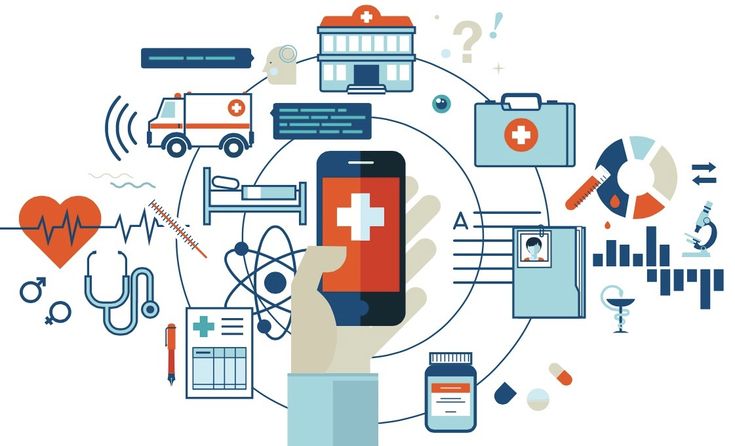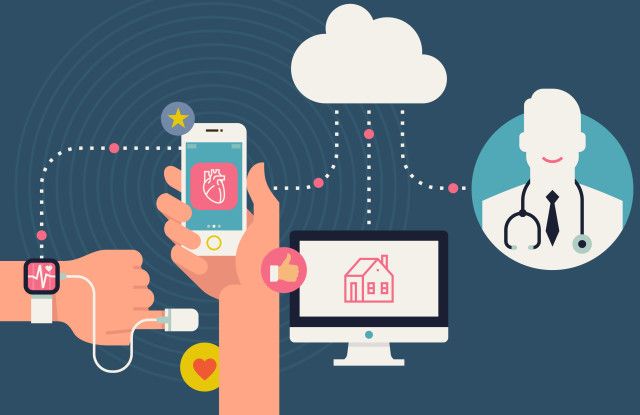Have you ever imagined a world where accessing healthcare is as simple as tapping a button on your smartphone? The good news? That world is here, and healthcare apps are at the heart of this revolution. Whether you’re aiming to create an app for telemedicine, fitness tracking, or patient management, the healthcare app market is a goldmine of opportunities waiting to be tapped.
With global digital health investments surpassing $26 billion in 2023, the time to create a healthcare app is now. This guide will walk you through the process, offering actionable insights to turn your idea into a thriving digital solution.

Why Healthcare Apps Are Game-Changers
Healthcare apps have transformed how we interact with medical services. They empower users by offering:
- 24/7 Access: Patients can consult doctors anytime, anywhere.
- Cost Savings: Digital consultations reduce operational expenses.
- Personalization: AI-powered apps provide tailored health recommendations.
The healthcare app market is forecasted to grow at a compound annual growth rate (CAGR) of 16.5% from 2022 to 2030, underscoring the rising demand for innovative digital solutions in the health sector.
Types of Healthcare Apps
Healthcare apps cater to diverse needs, each designed to address specific challenges within the healthcare ecosystem. Understanding the different types will help you choose the right focus for your app:
- Telemedicine Apps
These apps connect patients and doctors for virtual consultations, breaking geographical barriers and providing 24/7 access to healthcare professionals. Perfect for routine check-ups or follow-ups, telemedicine apps save time and reduce costs. - Health Monitoring Apps
Designed to track vital health parameters, such as heart rate, sleep patterns, and glucose levels, these apps empower users to take charge of their health. They are especially valuable for managing chronic conditions like diabetes or hypertension. - Fitness and Wellness Apps
These apps focus on promoting healthy lifestyles by offering workout routines, calorie tracking, and wellness tips. They often integrate with wearables to provide real-time fitness data and motivation. - Medication Reminder Apps
Forgetting to take medicine can lead to serious health issues. Medication reminder apps help users stay on top of their prescriptions by sending timely notifications, improving adherence and health outcomes.
Hospital Management Apps
Aimed at healthcare providers, these apps simplify operations like managing patient records, scheduling appointments, and streamlining internal workflows. They enhance efficiency and reduce administrative burdens.
Essential Features of a Healthcare App
For your healthcare app to succeed, it must include user-friendly and functional features. Here’s a table summarizing the essentials:
| Feature | Why It’s Important |
| User Authentication | Secure login for patients and healthcare professionals. |
| Appointment Booking | Simplifies scheduling consultations. |
| Electronic Health Records | Enables easy access to medical history. |
| Payment Integration | Streamlines transactions for consultations and services. |
| Push Notifications | Sends reminders for appointments, medications, and health tips. |
| Telehealth Integration | Facilitates video and chat consultations. |
| Analytics and Reporting | Offers insights on patient health trends. |
Step-by-Step Guide to Healthcare App Development
Here’s your roadmap to creating a healthcare app that stands out in a crowded market:
1. Conduct Market Research
- Identify target users and their pain points.
- Study competitors to discover gaps and opportunities.
2. Define the App’s Purpose and Features
- Determine the app’s primary objective, such as remote consultations or fitness tracking.
- Prioritize features based on user needs.
3. Choose the Right Technology Stack
- Select frameworks and tools that align with your app’s functionality and scalability.
4. Focus on UI/UX Design
- Create a clean, intuitive design for ease of navigation.
- Test prototypes to ensure a seamless user experience.
5. Develop the Application
- Implement backend systems for data management.
- Ensure the app is compatible with both iOS and Android platforms.
6. Implement Security Measures
- Use encryption and two-factor authentication to safeguard sensitive data.
- Regularly test the app for vulnerabilities.
7. Comply with Regulations
- Adhere to laws like HIPAA in the U.S. or GDPR in the EU to avoid legal issues.
8. Test and Launch
- Conduct rigorous testing for functionality, security, and user experience.
- Launch the app on relevant platforms and gather user feedback for improvements.
Technology Stack for Healthcare Apps
Choosing the right tech stack is crucial for developing a robust healthcare app. Here’s a recommended list:
| Component | Options |
| Frontend | React Native, Flutter |
| Backend | Node.js, Django, Ruby on Rails |
| Database | PostgreSQL, MongoDB |
| APIs | Twilio (communications), Stripe (payments) |
| Security Tools | Auth0, AES Encryption |
Overcoming Challenges in Healthcare App Development
Building a healthcare app comes with unique challenges. Here’s how to address them:
| Challenge | Solution |
| Data Security | Implement encryption, tokenization, and regular audits. |
| Regulatory Compliance | Work closely with legal experts to meet healthcare standards. |
| User Retention | Include features like gamification, rewards, and personalized health tips. |

Future Trends in Healthcare Apps
The healthcare app industry is evolving rapidly. Here are some emerging trends to watch:
- AI-Driven Diagnostics: Apps using AI to analyze symptoms and suggest treatments.
- IoT Integration: Wearables syncing with apps to provide real-time health data.
- Blockchain in Healthcare: Ensuring secure and transparent health record management.
These innovations promise a more connected and efficient healthcare system.
Expert Tip: Prioritize Compliance and Security
When developing a healthcare app, regulatory compliance is non-negotiable. “A single security breach can undermine user trust and attract severe penalties,” says Dr. Emily Carter, a digital health strategist. “Invest in top-tier encryption and ensure your app complies with relevant laws like HIPAA or GDPR. It’s not just about avoiding fines; it’s about earning trust.”
Conclusion
The development of a healthcare app is more than a technical achievement—it’s a commitment to reshaping how people access and interact with medical services. As the global demand for digital health solutions continues to surge, healthcare apps offer an unprecedented opportunity to bridge gaps in care, reduce costs, and improve patient outcomes.
Go Deeper:
- Explore HIPAA compliance standards for secure app development.
- Check out Statista’s healthcare app market trends for growth insights.
- Stay updated with Digital Health Insights for industry innovations.
Take the first step today, and transform your healthcare app idea into a groundbreaking solution!